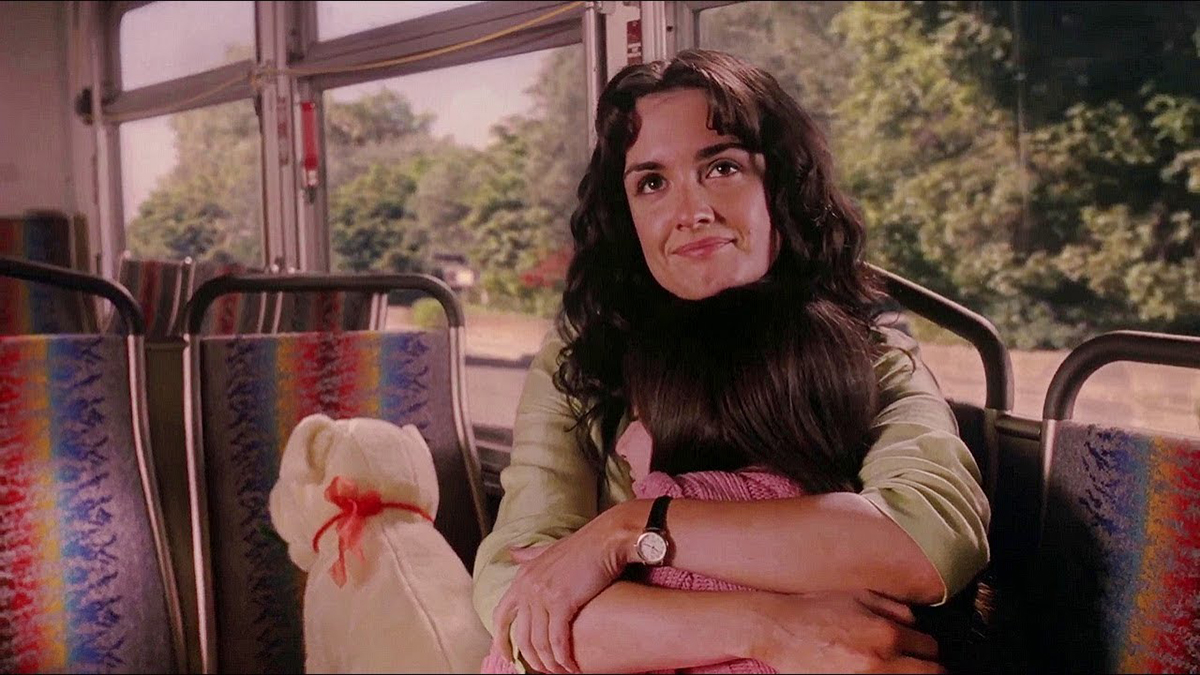I grew up in Tamaulipas, México, a state in northeastern Mexico that borders Texas. This proximity to the US influenced pretty much every aspect of my life: my education, my friends, the clothes I wore, the content and media I consumed (I developed a deep love for both banda and country music at a young age), and the language I spoke. Like many frontera kids, I learned to speak Spanish and English simultaneously; they’re both my native language. My parents hated it when I meshed them, telling me “habla bien.” My teachers would tell me to “pick one.” but I couldn’t. They were both ingrained into my brain in a way that, when one failed me or its words were not enough, the other automatically picked up the slack. I didn’t even have to think about it, the words flowed out of me as effortlessly and as naturally as I breathe. So of course, when a movie called Spanglish came out in 2004 I was immediately drawn to it.
I was young at the time, probably around 12 years old. Back then I felt a strong connection to the children in the film, Cristina Moreno and Bernie Clasky, because, well, they were closer to my age. I could easily relate to the heartbreak Bernie felt when her mother purposefully bought her new clothes a size too small to “encourage” her – I am still not over this scene. At 31, it still makes me cry like a baby. And I totally got Cristina’s annoyance that her mother wouldn’t “make an effort” to learn a new language, leaving her daughter to be her perpetual translator. To my younger self, it felt wrong that Cristina’s mom Flor (played by Spanish actress Paz Vega, more on this in a bit), seemingly made little to no effort to try to fit in when she had chosen to uproot their life and move across the border (yes, I am aware this opinion came from privilege; again, I was 12 at the time).
Watching the film as an adult, though, gave me a new perspective on things. Instead of focusing on why Flor didn’t learn English when she first moved to California (probably because she was too busy surviving and providing for her daughter, not to mention wanting to use whatever free time she had to spend some quality time with the aforementioned daughter), I noticed her boss, Deborah make an effort to pronounce “Flor” correctly, rolled R’s and all – something that many Americans will never bother to do. I watched Flor take on the arduous task of moving her young child and herself to a new country and leaving behind the comfort of all she’s ever known – including her language – and for the first time found myself relating to her instead of to her daughter. I realized Flor’s broken English, and later on, her Spanglish, was not something that made her feel ashamed; it was a sign of her determination to not let something as “trivial” as a language barrier stop her from doing exactly what she wanted to do. In so many ways, Flor reminded me of many people I know and love and of how amazed I am at their bravery.
Mixed languages, like Spanglish (or Portuñol, as Alessandra, one of my college teachers would refer to her mix of Portuguese and Spanish soon after she moved from Brazil to Mexico), are not a sign of weakness, laziness, or an inability to adapt to a new language and culture. They’re a sign of tenacity and resilience. And by the way, it’s not just me being a romantic about language because I’m a writer and I love words, there are studies to back up my claims, too! Mixed language speakers develop parts of their brain that allow them to code-switch, which ends up giving them more tools to effectively communicate in two languages simultaneously.
But, as much as I loved the movie, when I watched it through my adult eyes this time, I couldn’t shake the intense feeling of annoyance at one little detail: Flor, the Mexican immigrant whose language was no obstacle in the pursuit of happiness, was not played by a Mexican (or even a Latina) actress. Paz Vega is Spanish, not a Latina. It bothered me that Hollywood had once again chosen a white European actress to tell a story that is so deeply tied to the Latinx community.

This, sadly, isn’t the first (or last) time we see a Spanish actor portray a Latinx character. There’s a long line of famous – mostly Spanish – actors who have been doing for decades. There was Antonio Banderas in Spy Kids, Verónica Echegui in Book of Love, Joaquim de Almeida in Desperado, Javier Bardem in Being the Ricardos, Penélope Cruz in Bandidas… and many of them are repeat offenders, having appeared in more than one film playing a Latinx person.
Of course, many people will be quick to brush this off as a case of “it’s just acting,” but in an industry that’s riddled with a stubborn lack of representation, we can’t keep accepting Latinx stories told by people who aren’t Latinx! Providing a platform for our voices (in English, Spanish, or Spanglish!) is not enough anymore, not when other people get hired to speak (or act) in our name. No one can tell our stories and share our experiences better than we can — only we know the nuances that make them worth telling (and worth spending millions of dollars to make a film about).
We can’t undo the past, that’s for sure, but we can keep doing our part to make sure that our stories are being told by us, in whatever language (or combination of languages) we decide. Then, we’ll be able to look back on movies like Spanglish with pride.

